 Petzlover
Petzlover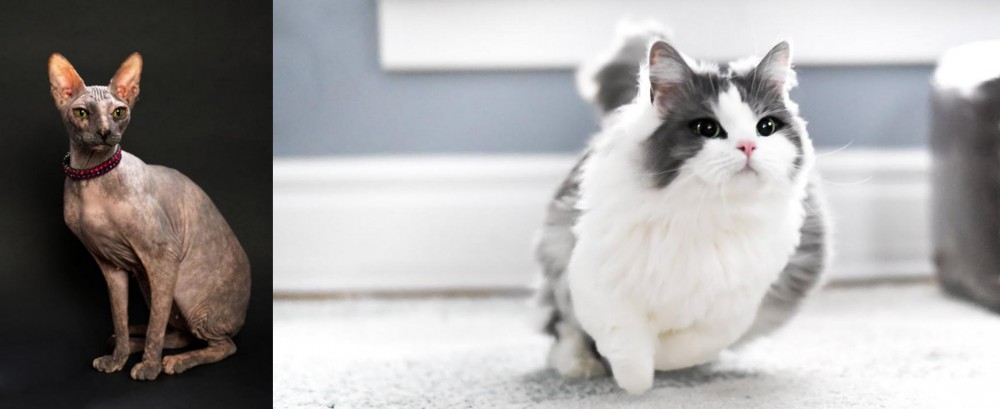 Don Sphynx is originated from Russia but Munchkin is originated from United States. Both Don Sphynx and Munchkin are having almost same weight. Both Don Sphynx and Munchkin has same life span. Both Don Sphynx and Munchkin has same litter size. Both Don Sphynx and Munchkin requires Low Maintenance.
Don Sphynx is originated from Russia but Munchkin is originated from United States. Both Don Sphynx and Munchkin are having almost same weight. Both Don Sphynx and Munchkin has same life span. Both Don Sphynx and Munchkin has same litter size. Both Don Sphynx and Munchkin requires Low Maintenance.
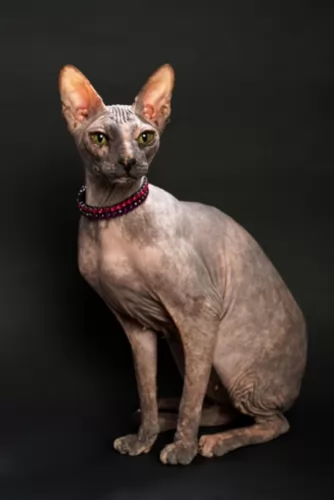 Of Rusian origin, the Don Sphynx is an interesting looking, hairless breed. The cat came about in 1987 when a hairless cat was seen in Rostov-on-Don, a Russian city.
Of Rusian origin, the Don Sphynx is an interesting looking, hairless breed. The cat came about in 1987 when a hairless cat was seen in Rostov-on-Don, a Russian city.
Cat breeder Elena Kovaleva rescued the kitten and it was at about 4 months of age that the kitten began to lose its hair. Later it was mated with a local tomcat and produced kittens which became the founding stock of the Donskoy breed.
The cat breed was recognized by the World Cat Federation in 1997 as well as the International Cat Association later on in 2005.
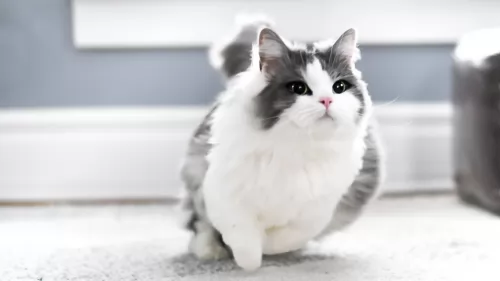 Information about the short-legged Munchkin cat has been around since the 1940s. A British veterinary report in 1944 noted these short-legged cats.
Information about the short-legged Munchkin cat has been around since the 1940s. A British veterinary report in 1944 noted these short-legged cats.
During the 2nd World War, the cats disappeared but other short-legged cats were seen in Russia during 1956 and then the United States in the 1970s.
The cat was introduced to the general public in 1991 but for many years it wasn't accepted in cat competitions. Eventually, the Munchkin was proposed as a new breed by foundation breeders and accepted by TICA into its New Breed development program in 1994. The Munchkin breed achieved TICA Championship status in May 2003. The Cat Fanciers Association doesn’t recognize the Munchkin.
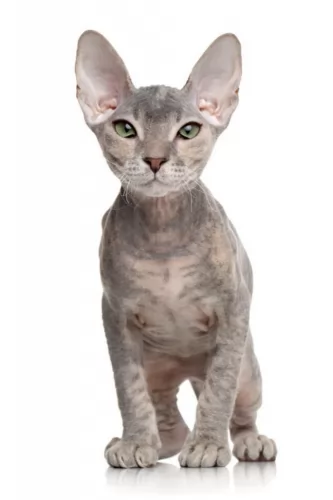 The Don Sphynx is a medium-sized cat known for its large ears and its long, webbed toes.
The Don Sphynx is a medium-sized cat known for its large ears and its long, webbed toes.
Their weight can be anything from 3 to 6 kg It’s a hairless cat but has different skin types that come in different shades – Flock, Rubber Bald, Velour and Brush.
The cat has this dominant hair loss gene that causes the coat they have at birth to thin and fall out. In fact, on close inspection, you’ll find that the cat isn’t entirely hairless but has a very fine layer of fuzz. The skin can be oily and the cat requires bathing fairly regularly.
These particular cats are also more susceptible to the cold and to sunburn. The legs of this cat are long and slender and they have a bit of a bow-legged appearance to them, but this is because of the barrel chest. The tail is long and hard.
These rare cats make excellent pets because they have all the characteristics needed that make them companionable. They are loving, companionable and playful. These are also intelligent, exploring cats which means you’ll need to provide them with games and toys that can keep them occupied.
They’re good with children and other pets and are even good for first-time cat owners. Breeders of these cats will tell you that they are even-tempered and amicable. They are gentle towards children and other pets.
Most of the time the cat has a calm demeanor but is highly sociable. As an entertainer too – he will do anything to get a laugh out of his human family.
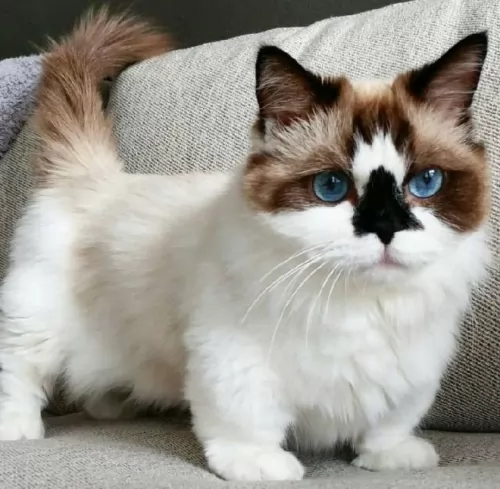 The Munchkin is a small to medium-sized, muscular cat with a thick coat that comes in all colors and patterns. In fact, color, pattern, and coat length will vary.
The Munchkin is a small to medium-sized, muscular cat with a thick coat that comes in all colors and patterns. In fact, color, pattern, and coat length will vary.
There is also a long-haired variety. It usually weighs between 3 and 4kg. It has short, stubby little legs and a torso that hangs fairly low to the ground. The cat’s back legs are somewhat longer than the front legs. The legs of these cats can be slightly bowed. The eyes can be any color.
The Munchkin is such a social, outgoing cat that just loves being petted and pampered by his human family. He is sociable and friendly as well as intelligent and is easy to train. While he is an amicable cat and can get on well with everyone in the family, it isn’t a good idea to have such a cat as a playmate for children as they can become injured.
An interesting feature with this cat is the way he doesn’t really sit like other cats but has a way of sitting up on his legs, much like a rabbit.
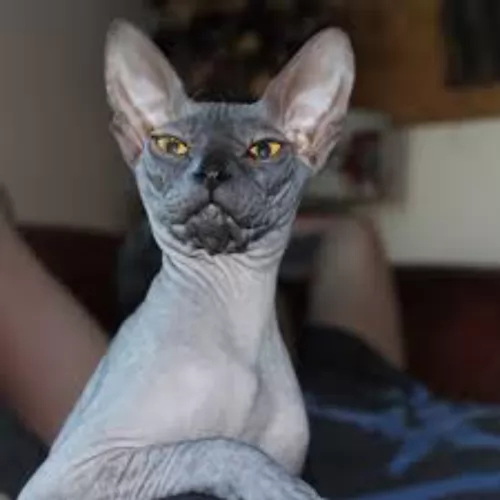 The sphynx cat is an energetic feline that absolutely loves the attention of its human owners. In fact, he will even be willing to show off to get some kind of reaction from his humans.
The sphynx cat is an energetic feline that absolutely loves the attention of its human owners. In fact, he will even be willing to show off to get some kind of reaction from his humans.
This is certainly a cat that has a sense of humor. They’re friendly, loving cats who like to even follow you around the house to be where you are. They are loving and loyal, curious, intelligent and active.
It’s a hardy breed and you won’t have many health issues to contend with. We know that they are prone to skin conditions and periodontal disease so watch out for these with this amazing, but unusual looking cat.
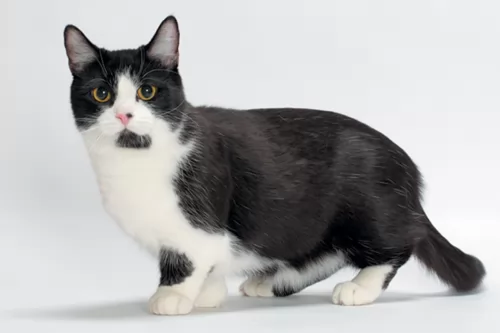 The Munchkin may be short and stock but he is just as active and playful as any other cat. When you have him in your home, you'll discover that his short little legs don't stop him from trying out everything other cats do.
The Munchkin may be short and stock but he is just as active and playful as any other cat. When you have him in your home, you'll discover that his short little legs don't stop him from trying out everything other cats do.
He is ready to show you what he's made of. He is a confident, social cat and is friendly, intelligent, and loving towards his human family. He makes a devoted companion and he will get along with other cats in the family as well as dogs.
He may be a bit odd to look at but if you want an excellent companion, the Munchkin is well worth your consideration.
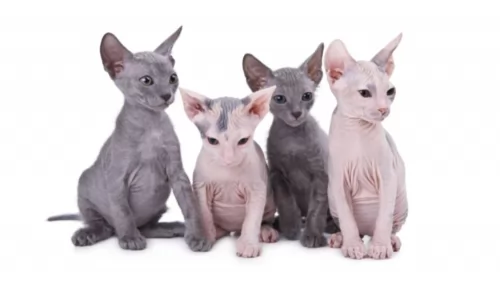 Hairless cats are prone to teeth and gum issues, and every Don Sphynx owner needs to regularly check their cat’s teeth as bad teeth can cause a lot of problems with health as well as discomfort with the teeth.
Hairless cats are prone to teeth and gum issues, and every Don Sphynx owner needs to regularly check their cat’s teeth as bad teeth can cause a lot of problems with health as well as discomfort with the teeth.
This cat breed is also fairly prone to skin problems. You will need to watch him for rashes and fungal infections. Remember, that this strange-looking cat also needs vaccinations and de-worming as well as regular veterinary health checks.
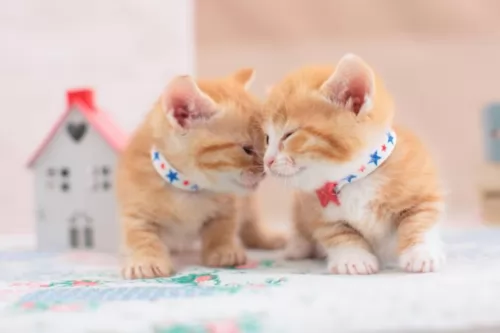 Because this is a fairly new breed, it's still not too clear about its health. It was once thought that the Munchkin cat could develop spinal problems because of its short legs.
Because this is a fairly new breed, it's still not too clear about its health. It was once thought that the Munchkin cat could develop spinal problems because of its short legs.
It was in 1995 that some breeders had some of their older Munchkins x-rayed to see if there were any signs of joint or bone problems, but none were found.
The Munchkin cat should also be vaccinated as a kitten and be treated for parasites. To ensure the good health of your sweet little Munchkin cat, give him the best diet possible.
In fact, if you take good care of your Munchkin and you make sure to get all the necessary vaccines for him and get him to the vet when he shows signs of illness, your munchkin can reach 12 to 15 years of age.
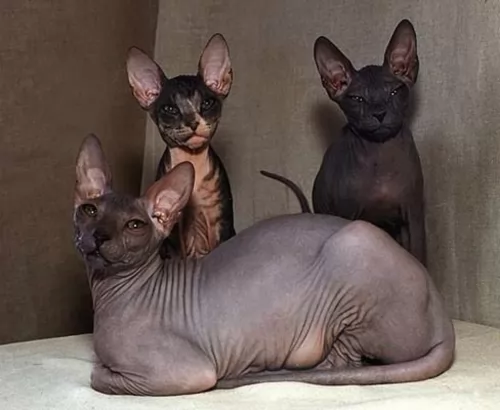 In spite of this being a hairless cat, it still requires frequent grooming, and yet you have to be careful that you don’t allow the cat to be bathed too often either.
In spite of this being a hairless cat, it still requires frequent grooming, and yet you have to be careful that you don’t allow the cat to be bathed too often either.
Have your cat spayed or neutered to avoid kittens that you don’t want. This is beneficial for the cat’s health.
This is a unique cat and when it comes to food, if you can afford it, go for the very best food there is. Good food contributes to good health and this cat is a carnivore and requires food high in meat protein.
Of course, it requires other nutrients and the best commercially manufactured cat foods will have a list of ingredients in them that are important to your cat’s health.
Of course, with diet, there are other important considerations to think about and one of these is the right quantity of food to maintain the cat’s ideal weight. Too much weight gain can put pressure on the cat’s joints and contribute to health problems.
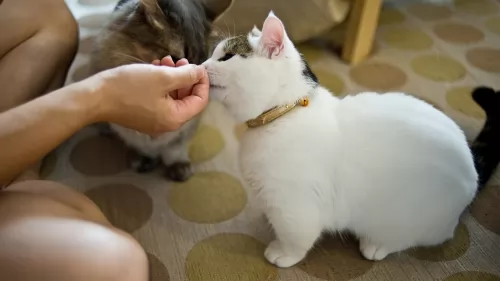 Every cat is unique and the Munchkin is a unique cat, This little cat is a carnivore just like any other cat and his diet must be made up mostly of protein.
Every cat is unique and the Munchkin is a unique cat, This little cat is a carnivore just like any other cat and his diet must be made up mostly of protein.
Speak to your vet about the best food for your Munchkin because a kitten will require a different diet to a senior Munchkin. Also, you don’t want your Munchkin to put on too much weight as this can be detrimental to his joints.
Not only that, being overweight comes with all kinds of health issues. The manufacturers of commercially manufactured cat foods have made sure that they have brought out foods for every stage of a cat's life and age.
Munchkin cats will need to have their fur brushed at least once a week. Trim the claws at the same time.
Provide your sweet little Munchkin with a litter box and keep the litter box immaculately clean, removing the feces every single day.